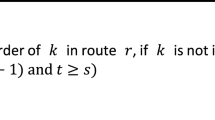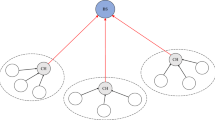Abstract
In this paper we study the problem of assigning transmission ranges to the nodes of a static ad hoc wireless network so as to minimize the total power consumed under the constraint that enough power is provided to the nodes to ensure that the network is connected. We focus on the Min-Power Symmetric Connectivity problem, in which the bidirectional links established by the transmission ranges are required to form a connected graph.
Implicit in previous work on transmission range assignment under asymmetric connectivity requirements is the proof that Min-Power Symmetric Connectivity is NP-hard and that the MST algorithm has a performance ratio of 2. In this paper we make the following contributions: (1) we show that the related Min-Power Symmetric Unicast problem can be solved efficiently by a shortest-path computation in an appropriately constructed auxiliary graph; (2) we give an exact branch and cut algorithm based on a new integer linear program formulation solving instances with up to 35–40 nodes in 1 hour; (3) we establish the similarity between Min-Power Symmetric Connectivity and the classic Steiner Tree problem in graphs, and use this similarity to give a polynomial-time approximation scheme with performance ratio approaching 5/3 as well as a more practical approximation algorithm with approximation factor 11/6; and (4) we give the results of a comprehensive experimental study comparing new and previously proposed heuristics with the above exact and approximation algorithms.
Similar content being viewed by others
References
E. Althaus, G. Călinescu, I.I. Măndoiu, S. Prasad, N. Tchervenski and A.Z. Zelikovsky, Power efficient range assignment in ad-hoc wireless networks, in: Proc. IEEE Wireless Communications and Networking Conference (WCNC) (2003) pp. 1889–1894.
P. Berman and V. Ramaiyer, Improved approximations for the Steiner tree problem, Journal of Algorithms 17 (1994) 381–408.
D.M. Blough, M. Leoncini, G. Resta and P. Santi, On the symmetric range assignment problem in wireless ad hoc networks, in: 2nd IFIP International Conference on Theoretical Computer Science (TCS 2002), (Kluwer Academic Publishers, 2002) pp. 71–82.
A. Borchers and D.-Z. Du, The k-Steiner ratio in graphs, SIAM Journal on Computing 26 (1997) 857–869.
P.M. Camerini, G. Galbiati and F. Maffioli, Random pseudo-polynomial algorithms for exact matroid problems, Journal of Algorithms 13 (1992) 258–273.
E.-A. Choukhmane, Une heuristique pour le probleme de l’arbre de Steiner, RAIRO Rech. Oper 12 (1978) 207–212.
T. Chu and I. Nikolaidis, Energy efficient broadcast in mobile ad hoc networks, in: Proc. AD-HOC Networks and Wireless (2002).
A.E.F. Clementi, P. Crescenzi, P. Penna, G. Rossi and P. Vocca, On the complexity of computing minimum energy consumption broadcast subgraphs, in: Symposium on Theoretical Aspects of Computer Science, (2001) pp. 121–131.
A.E.F. Clementi, P. Penna and R. Silvestri, On the power assignment problem in radio networks, Electronic Colloquium on Computational Complexity (ECCC) (054), 2000.
T.H. Cormen, C.E. Leiserson and R.L. Rivest, Introduction to Algorithms, 2nd ed. (MIT Press, Cambridge, Massachusetts, 2001).
G. Călinescu, I.I. Măndoiu and A.Z. Zelikovsky, Symmetric connectivity with minimum power consumption in radio networks. in: 2nd IFIP International Conference on Theoretical Computer Science (TCS 2002), Kluwer Academic Publishers, 2002, pp. 119–130.
M. de Berg, M. van Kreveld, M. Overmars and O. Schwarzkopf, Computational Geometry — Algorithms and Applications (Springer Verlag, Berlin, 1997).
D.-Z. Du, Y.-J. Zhang and Q. Feng, On better heuristic for Euclidean Steiner minimum trees, in: Proc. 32nd Annual IEEE Symposium on Foundations of Computer Science (1991) pp. 431–439.
S. Guha and S. Khuller, Approximation algorithms for connected dominating sets, Algorithmica 20 (1998) 374–387.
A. B. Kahng and G. Robins, A new class of iterative Steiner tree heuristics with good performance, IEEE Transactions on Computer-Aided Design 11 (1992) 893–902.
L.M. Kirousis, E. Kranakis, D. Krizanc and A. Pelc, Power consumption in packet radio networks, Theoretical Computer Science 243 (2000) 289–305.
L. Kou, G. Markowsky and L. Berman, A fast algorithm for Steiner trees, Acta Informatica 15 (1981) 141–145.
E. Lloyd, R. Liu, M. Marathe, R. Ramanathan and S.S. Ravi, Algorithmic aspects of topology control problems for ad hoc networks, in: Proc. ACM MobiHoc (2002) pp. 123–134.
L. Lovász and M.D. Plummer, Matching Theory. (North-Holland, Amsterdam–New York, 1986).
M. Padberg and L. Wolsey, Trees and cuts, Anals of Discrete Mathematics 17 (1983) 511–517.
H.J. Promel and A. Steger, A new approximation algorithm for the Steiner tree problem with performance ratio 5/3, Journal of Algorithms 36 (2000) 89–101.
R. Ramanathan and R. Hain, Topology control of multihop wireless networks using transmit power adjustment, in: Proc. IEEE INFOCOM (2000) pp. 404–413.
T.S. Rappaport, Wireless Communications: Principles and Practices (Prentice Hall, 1996).
G. Robins and A. Zelikovsky, Improved Steiner tree approximation in graphs, in: Proceedings of the 11th ACM-SIAM Annual Symposium on Discrete Algorithms (2000) pp. 770–779.
SCIL–Symbolic Constraints for Integer Linear programming. www.mpi-sb.mpg.de/SCIL.
S. Singh, C.S. Raghavendra and J. Stepanek, Power-aware broadcasting in mobile ad hoc networks, in: Proceedings of IEEE PIMRC, 1999.
A.S. Tanembaum, Computer Networks, 3rd ed. (Prentice Hall, 1996).
Mikkel Thorup, Undirected single-source shortest paths with positive integer weights in linear time, Journal of the ACM 46 (1999) 362–394.
P.-J. Wan, G. Calinescu, X.-Y. Li and O. Frieder, Minimum energy broadcast routing in static ad hoc wireless networks, in: Proc. IEEE INFOCOM (2001) pp. 1162–1171.
J.E. Wieselthier, G.D. Nguyen and A. Ephremides, On the construction of energy-efficient broadcast and multicast trees in wireless networks, in: Proc. IEEE INFOCOM (2000) pp. 585–594.
A. Zelikovsky, An 11/6-approximation algorithm for the network Steiner problem, Algorithmica 9 (1993) 463–470.
A. Zelikovsky, Better approximation bounds for the network and Euclidean Steiner tree problems, Technical Report CS-96-06, Department of Computer Science, University of Virginia, 1996.
Author information
Authors and Affiliations
Corresponding author
Additional information
Ernst Althaus received the M.S. degree in 1998 and the Ph.D. degree in 2001, both in Computer Science, from the Universität des Saarlandes. He worked as a postdoctoral researcher at the International Computer Science Institute in Berkeley and at the Max-Planck-Institut für Informatik in Saarbrücken. Ernst Althaus is now the head of an independent research group on “optimization in bioinformatics” at the Laboratoire Lorrain de Recherche en Informatique et ses Applications (LORIA), Nancy. His research interests include combinatorial optimization, bioinformatics, and algorithms.
Gruia Călinescu is an Assistant Professor of Computer Science at the Illinois Institute of Technology. He has a Diploma from University of Bucharest and a PhD from Georgia Institute of Technology. His research interests are in the area of algorithms.
Ion I. Măndoiu received the M.S. degree from Bucharest University in 1992 and the Ph.D. degree from Georgia Institute of Technology in 2000, both in Computer Science. He is now an Assistant Professor with the Computer Science and Engineering Department at the University of Connecticut. His research focuses on the design and analysis of exact and approximation algorithms for NP-hard optimization problems, particularly in the areas of VLSI computer aided design, bioinformatics, and ad-hoc wireless notworks. He authored over 40 refereed scientific publications in these areas, including a best paper at the joint Asia-South Pacific Design Automation/VLSI Design Conferences.
Sushil K. Prasad received his B. Tech. in Computer Science and Engineering from Indian Institute of Technology, Kharagpur, in 1985, M.S. in Computer Science from Washington State University, Pullman, in 1986, and Ph.D. in Computer Science from University of Central Florida, Orlando, in 1990. Since 1990, he has been a Professor of Computer Science at Georgia State University (GSU), Atlanta. Currently, as P.I. of the Yamacraw/GEDC Distributed, Mobile and Embedded Systems research contracts, he is leading a GSU team of seven faculty and 20 Ph.D./M.S. students on developing System on Mobile Devices (SyD) middleware for collaborative computing over heterogeneous mobile devices and data sources. Prasad has carried out theoretical as well as experimental research in parallel and distributed computing, with over 55 publications, and made 3 utility patent applications and over a dozen provisional patent applications. His current research interests are Parallel Algorithms and Data Structures, Parallel Discrete Event Simulation, Web-based Distributed and Collaborative Computing, and Middlewares and Collaborative Applications for Handheld Devices.
Nickolay Tchervenski received his B.S. in Computer Engineering with highest honors from Illinois Institute of Technology in 2004. At IIT, Nickolay was advised by Prof. Calinescu. In Fall 2004, Nickolay joined the Database Research Group at University of Waterloo where he is doing his Masters Degree in Computer Science. World finalist at the 28th ACM International Collegiate Programming Contest in Prague, Nickolay’s research interests are in algorithms and large databases.
Alexander Zelikovsky received the Ph.D. degree in Computer Science from the Institute of Mathematics of the Belorussian Academy of Sciences in Minsk (Belarus) in 1989 and worked at the Institute of Mathematics in Kishinev (Moldova) (1989–1995). Between 1992 and 1995 he visited Bonn University and the Institut fur Informatik in Saarbrueken (Germany). Dr. Zelikovsky was a Research Scientist at University of Virginia (1995–1997) and a Postdoctoral Scholar at UCLA (1997–1998). He is an Associate Professor at Computer Science Department of Georgia State University which he joined in 1999. He is the author of more than 90 refereed publications. Dr. Zelikovsky’s research interests include VLSI physical layout design, ad-hoc wireless networks, discrete and approximation algorithms, combinatorial optimization, and computational biology.
Preliminary versions of the results in this paper have appeared in [1, 11].
Rights and permissions
About this article
Cite this article
Althaus, E., Călinescu, G., Măndoiu, I.I. et al. Power Efficient Range Assignment for Symmetric Connectivity in Static Ad Hoc Wireless Networks. Wireless Netw 12, 287–299 (2006). https://doi.org/10.1007/s11276-005-5275-x
Published:
Issue Date:
DOI: https://doi.org/10.1007/s11276-005-5275-x




